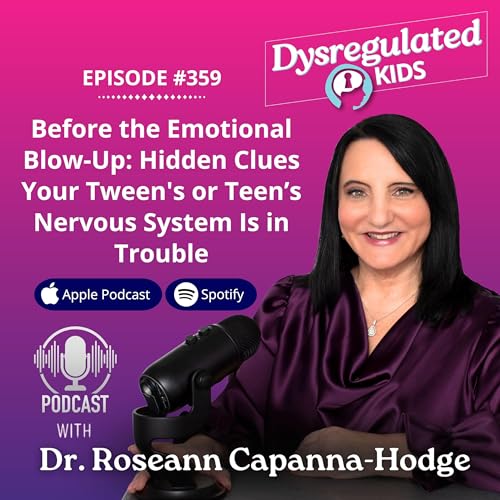
359: Before the Emotional Blow-Up: Hidden Clues Your Kid's Nervous System Is in Trouble
Failed to add items
Add to Cart failed.
Add to Wish List failed.
Remove from wishlist failed.
Adding to library failed
Follow podcast failed
Unfollow podcast failed
-
Narrated by:
-
By:
Parenting a child, tween or teen who swings from calm to chaos in seconds can leave you walking on eggshells. One minute they’re fine, and the next—doors slam, voices rise, and you’re wondering what just happened. You’re not alone. Those big mood swings aren’t “attitude.” They’re signals that your child’s nervous system is in distress.
Let’s dive into the hidden clues your child's, tween’s or teen’s nervous system is in trouble, how to decode them before they explode, and practical steps to bring calm back to your home.
Why does my kid overreact to small things?
When your child melts down over a lost pencil or a simple “no,” it’s not defiance—it’s a sign of an overwhelmed nervous system. Their brain is already running on empty, and even a tiny trigger can send them over the edge.
What this means:
- Overreactions = stress overload. Their stress cup is full, and every little thing spills over.
- Persistent irritability or mood whiplash can signal emotional dysregulation, not disrespect.
- Physical signs like chest tightness, rapid heartbeat, or stomach pain often accompany these reactions.
🗣️ “Behavior is communication. Once you learn to read these cues, you stop reacting to the behavior and start guiding your child back to calm.” –Dr. Roseann
Why can’t my kid calm down after getting upset?
If your teen stays upset long after the conflict ends, that’s a clue their body’s stress response hasn’t shut off. Their stress hormones keep them on high alert, making it hard to return to balance.
Try this:
- Regulate first. Take one deep breath before engaging. When you calm your brain, it helps theirs settle too.
- Name the shift. Say, “I can see this feels really big for you.” Validation lowers the nervous system threat.
- Use micro-resets. Short breaks, snacks, or movement stop the spiral.
Remember: the more calm happens, the more calm happens.
Is shutting down or saying “I don’t care” a warning sign?
When teens go silent, refuse to talk, or withdraw, it’s often freeze mode, not attitude. This happens when their nervous system feels unsafe or overwhelmed—a common sign of emotional strain or unresolved trauma.
Look for:
- Sudden withdrawal from friends or activities
- Changes in eating or sleep habits—like skipping meals, difficulty falling asleep, or frequent nightmares
- Physical complaints such as headaches, stomach pain, or fatigue
A trauma-informed approach helps teens feel seen, not shamed. It’s not bad parenting—it’s a dysregulated brain.
If you’re tired of walking on eggshells or feeling like nothing works…
Get the FREE Regulation Rescue Kit and finally learn what to say and do in the heat of the moment.
Become a Dysregulation Insider VIP at www.drroseann.com/newsletter and take the first step to a calmer home.
Why does my child struggle with focus or schoolwork?
Stress doesn’t just...


